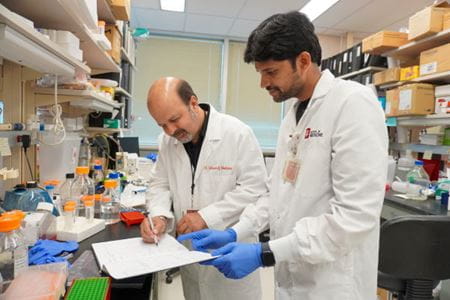INDIANAPOLIS — Indiana University School of Medicine scientists have discovered a potential new strategy to combat leukemia through a special approach that targets both cancer cells and their protective environment. The study, recently published in Nature Communications, focuses on an aggressive form of blood cancer called acute myeloid leukemia and offers insights that could help improve therapies for other difficult-to-treat cancers.
Acute myeloid leukemia is one of the most common forms of leukemia in adults and is often fatal. The disease progresses quickly and tends to relapse even after aggressive treatment attempts, largely because current therapies struggle to eliminate leukemia stem cells. These stem cells not only survive treatment but also release stress signals that weaken the immune system and support cancer growth.
“Our research was inspired by the urgent need to target these resilient cells,” said Santhosh Pasupuleti, PhD, co-author of the study and assistant research professor of pediatrics at the IU School of Medicine. “Our approach provides a way to overcome treatment resistance by targeting the harmful leukemia stem cells and the protective environment around them, which are like the ‘seed and soil’ of leukemia.”
The researchers discovered that leukemia stem cells release a stress signal triggered by a molecule called Interleukin-33, or IL-33. This molecule activates a protein on both the leukemia cells and nearby immune cells known as Interleukin 1 receptor-like 1, or IL1RL1. The combination of this process creates a damaging loop that promotes cancer growth and suppresses the body’s natural immune system defenses.
To break this cycle, scientists from the IU School of Medicine, the Medical University of South Carolina Hollings Cancer Center and Memorial Sloan Kettering Cancer Center developed a specialized form of antibody that helps immune T cells recognize and destroy leukemia stem cells, while also blocking the IL-33 stress signals that protect the cancer.
Results from preclinical models, including models with mice and human leukemia cells, showed these specialized antibodies successfully eliminated leukemia stem cells and improved disease control.
“We hope this study opens the door to a new generation of immunotherapies for leukemia,” said Reuben Kapur, PhD, director and program leader of the Hematologic Malignancies and Stem Cell Biology Program at the IU School of Medicine Herman B Wells Center for Pediatric Research and co-author of the study. “The molecular signals we identified could also be relevant in other cancers or diseases where immune suppression plays a role. Ultimately, our goal is to develop therapies that prevent relapse and improve survival in patients with acute myeloid leukemia and possibly other difficult-to-treat cancers.”
Kapur and Pasupuleti are also researchers at the Indiana University Melvin and Bren Simon Comprehensive Cancer Center.
The team hopes to advance this therapeutic approach toward clinical trials for acute myeloid leukemia and continue exploring its potential in other diseases.
This research was supported by funding from the National Institutes of Health.
About Indiana University School of Medicine
The IU School of Medicine is the largest medical school in the U.S. and is annually ranked among the top medical schools in the nation by U.S. News & World Report. The school offers high-quality medical education, access to leading medical research and rich campus life in nine Indiana cities, including rural and urban locations consistently recognized for livability. According to the Blue Ridge Institute for Medical Research, the IU School of Medicine ranks No. 13 in 2024 National Institutes of Health funding among all public medical schools in the country.
Writer: Jackie Maupin, jacmaup@iu.edu
For more news, visit the IU School of Medicine Newsroom: medicine.iu.edu/news




